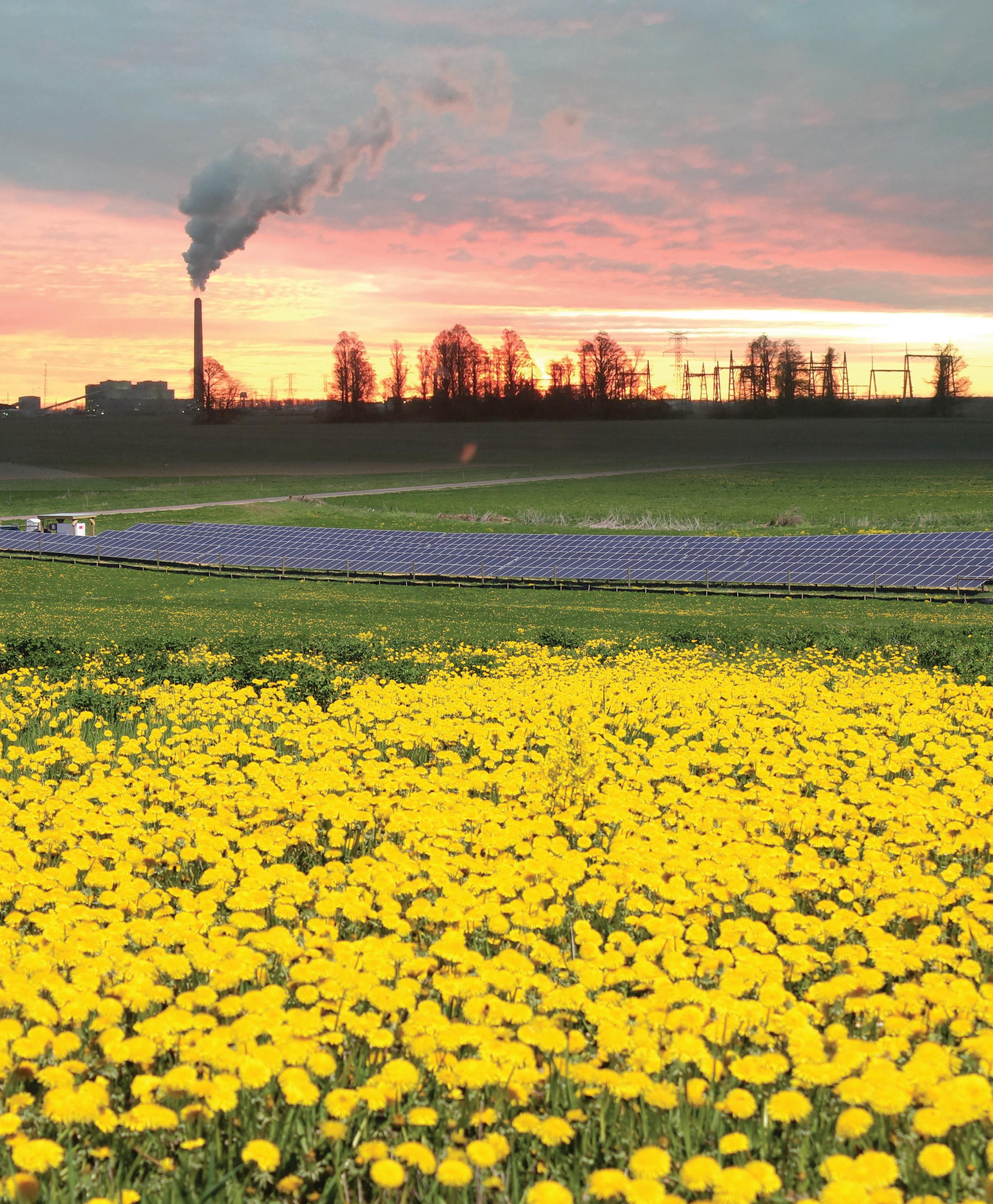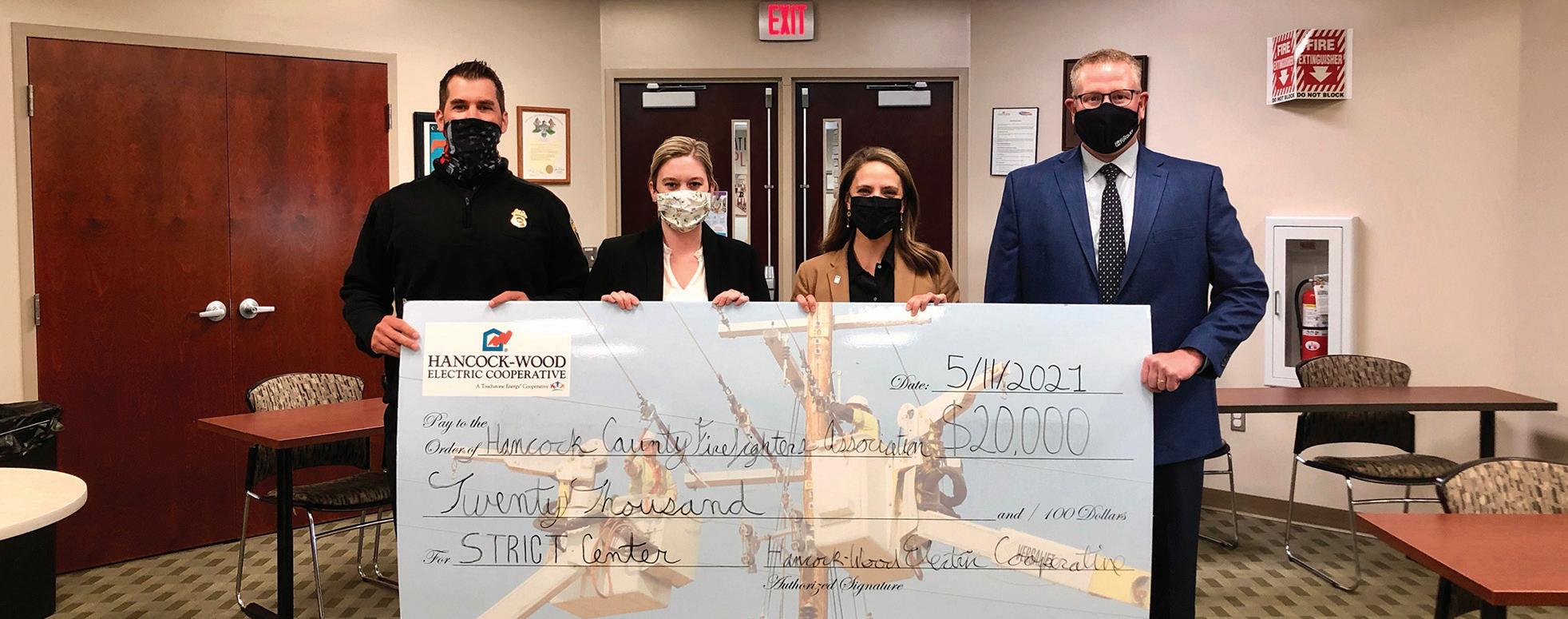
9 minute read
LOCAL PAGES
HANCOCK-WOOD ELECTRIC COOPERATIVE
MESSAGE FROM THE PRESIDENT AND CEO ENSURING RELIABILITY
as power supply tightens
You expect reliable and affordable electricity from your electric cooperative, so how does your co-op deliver on that promise? A complex network of electricity generators and tens of thousands of miles of electrical lines work together to ensure that enough electricity is available on the coldest winter morning and during the dog days of summer. What happens when the demand for power overwhelms the ability to provide it? That’s a particularly vexing question given the transition taking place in how electricity is produced and shared across this network. The key to meeting the energy needs so essential to your quality of life is balancing electricity supply with demand. While that may sound simple, there is a complex web of facilities and organizations that work together to make it happen each day. Regional transmission organizations coordinate, control, and monitor the electric grid across several states in a region. Think of them as energy traffic managers on an interstate highway system, regulating the number of cars — in this case, electricity — and their destination. Even so, on some days there is an imbalance in that system that leads to rolling power interruptions or blackouts — so-called “max-gen” events. In those cases, supply simply can’t keep up. Fortunately for electric cooperative members in Ohio, PJM, the 13-state regional transmission organization that extends from Ohio to New Jersey, has only experienced one of those events since 2016. To our west is MISO, comprising 15 states. Since 2016, there have been 15 max-gen events in MISO, including three last July and August alone. Simply, that’s because power plants that generate electricity are being closed faster than new producers come online. In most cases, traditional large-scale power suppliers such as coal and nuclear plants are being closed and replaced by alternatives on a much smaller scale. And this gap is closing more quickly despite the development of new natural gasfueled power plants. As more electric utilities pursue zero- or low-carbon initiatives by 2035 and beyond, this challenge will grow more complex. So, what’s the answer? Electric cooperatives and others in the energy sector will continue George Walton to develop renewable options PRESIDENT & CEO and pursue new technologies. But absent new large-scale alternatives and advances in energy storage, the stalwarts of today’s energy fleet — coal and nuclear energy facilities — must continue to operate in many regions. In some, they remain the most cost-effective options for producing electricity.


Hancock-Wood Electric Cooperative donates $20,000 to STRICT Center

From left: Findlay Fire Department Fire Chief Joshua Eberle, HWE Director of Marketing and Communications Leslie Guisinger, Mayor of Findlay Christina Muryn, and City of Findlay Service-Safety Director Rob Martin. Hancock-Wood Electric Cooperative, in partnership with CoBank, presented a $20,000 donation to the Hancock Firefighters Association for the Simulated Tactical Response and Incident Command Training (STRICT) Center, an innovative training complex for Findlay and Hancock County’s first responders. The STRICT Center will provide space for different first responder trainings, including fire departments, EMS, and law enforcement and will be conveniently located right in Hancock County. The facility will be at Findlay Fire Station 4 on County Road 236. This location is central to Hancock County, which eliminates the need for area first responders to travel long distances to receive effective training. Not only will the training center minimize time away from family or work for departments conducting training, but it also allows those departments to still have personnel available for emergencies while they are training. “Hancock-Wood Electric feels this is an important project for our surrounding communities and will be a major benefit to all of the first responders in our area,” says Hancock-Wood Electric President George Walton.
Think Energy $mart With Bruce
Last month, I provided an overview of different types of water heaters. This month, I am focusing on electric tank water heaters. I will provide you with advantages and disadvantages compared to other water heating technologies.
A 50-gallon electric tank water heater is a common appliance used to provide domestic hot water. The price to purchase one of these heaters from a box store is $400 to $500. If you have a contractor install it, the cost will be will around $800 to $1000.
Here are a couple advantages of using an electric hot water tank.
• Few moving parts.
◊ These water heaters do not have any fans or a gas valve that can fail, causing the loss of hot water.
• Cost to replace/purchase.
◊ Electric water tanks are the least expensive option to purchase when heating water for your home.
Here are a couple of disadvantages of using an electric water tank.
• Slower recovery time.
◊ An electric water heater will heat only around 20 gallons per hour at a 90-degree rise compared to around 50 gallons per hour from a gas water tank.
• Cost of operation.
◊ The yearly cost to operate an electric water heater is about 15% more than using propane and 30% more than using natural gas.
Next month I will share information about gas water tanks.
Don’t fall victim to utility scams
Every day, millions of Americans are targeted by scammers through phone calls, emails, text messages, online, or in person. Scammers’ tactics can change daily, which is why it’s important for consumers to stay on top of the latest scam reports from local and national news outlets, as well as your local utility companies.
We want you to be aware of two trending scam tactics. One is the overpayment trick, where a scammer contacts you and claims that you have overpaid your utility bill. The scammer will say they need your personal banking information to deposit the credit back to your checking account. Don’t fall for this scam! If you make an overpayment on your energy bill, Hancock-Wood Electric will automatically apply the credit to your account, which will carry over to your next billing cycle. Another trending scam is smishing (short for SMS phishing). Many consumers know to watch out for suspicious emails, but we tend to trust text messages sent to our smartphones. Always question suspicious texts, especially from someone claiming to represent a utility.
Here are a few reminders on how to take control of the situation when you’ve been targeted by a scammer:
• Take your time. Utility scammers try to create a sense of urgency so that you’ll act fast and hand over personal information, especially over the phone. Take a moment to think about the situation before acting.
• Be suspicious. Scammers typically request immediate payments through prepaid debit cards or third-party apps. Unusual requests like this should raise red flags.
Remember, if the request seems strange and out of the ordinary, you’re likely being targeted by a scammer.
• Confirm before you act. If you’re contacted by someone claiming to represent HancockWood Electric or another utility but you’re unsure, just hang up the phone and call the utility directly. You can reach us at 800-445-4840 to verify the situation.
Our increasingly connected world provides scammers with more opportunities to connect with unsuspecting consumers. Be vigilant and report any utility scams Hancock-Wood Electric so we can let others in our community know. Together, we can help prevent our friends and neighbors from being victimized.
AVOID UTILITY SCAMS
Scammers will threaten you with everything from shutting o power to your home to legal action. Don't fall victim to these types of scams.
• Our employees will never show up at your door to demand payment. • Never give personal information to an unknown caller or visitor.
Our representatives have access to the details they need to service your account. • Demands for immediate payment by wire transfer, cryptocurrency, gift cards or cash reload cards should immediately raise red flags. • If you think you’ve been contacted by a scammer falsely representing the co-op, please let us know as soon as possible.
Hancock-Wood Electric Cooperative will be closed July 5. We wish our members a safe and happy holiday weekend! July 4thw e e k e n d

COOPERATIVE WORD SEARCH
As a member of an electric cooperative, you’re part of something special! Read the facts below to learn how co-ops are unique, then find and circle the BOLDED words in the puzzle.
I F B K S U X O G A P Y K Q A S E V I T A R E P O O C A K P V Q M B W S H F F H I P Q M T S G E P U T U O A W C W V S C L I M O R L E R K X E N T O M N T B E M I M O Y P O W M G D V H E G W P N Y N E A M Z W X Q W R E X F O C O N U I G A J O K S N X F I E I N O C L Q W S E R V E R L O I P I G Z O L N X H W T P K T B K L Z I B Q M B F C N A Y O A G V E U H V F G E H L Q F H E Y X S S C B S L U D W V F G A U E V G I R E Z H Q S Q M Q J D P T T A W WORD BANK:
• COOPERATIVES are local organizations and businesses, so they understand the communities they serve. • Co-ops don’t have customers; instead, they have MEMBERS. • All co-ops are guided by the same set of cooperative PRINCIPLES. • “Concern for
COMMUNITY” is the seventh cooperative principle. • Co-ops are led by the members they SERVE. • You’re a member of an
ELECTRIC cooperative, but there are also housing, grocery and other types of co-ops.
CONTACT
800-445-4840 FAX: 419-257-3024
WEBSITE
www.hwe.coop
OFFICE
1399 Business Park Drive South P.O. Box 190 North Baltimore, Ohio 45872-0190
BOARD OF TRUSTEES Gene Barker
Chairman
William Kale
Vice Chairman
Ed Crawford
Secretary/Treasurer
Lee Anne Dierksheide
Assistant Secretary
Tim Phillips Duane Fry Charles Beagle Tom Kagy Ron Riegle Brian Terry George Walton
President and CEO
PAYMENT OPTIONS
online, dropbox, office, by phone, or automatic bill pay
HAVE A STORY SUGGESTION?
Email your ideas to: leslie.guisinger@hwe.coop









